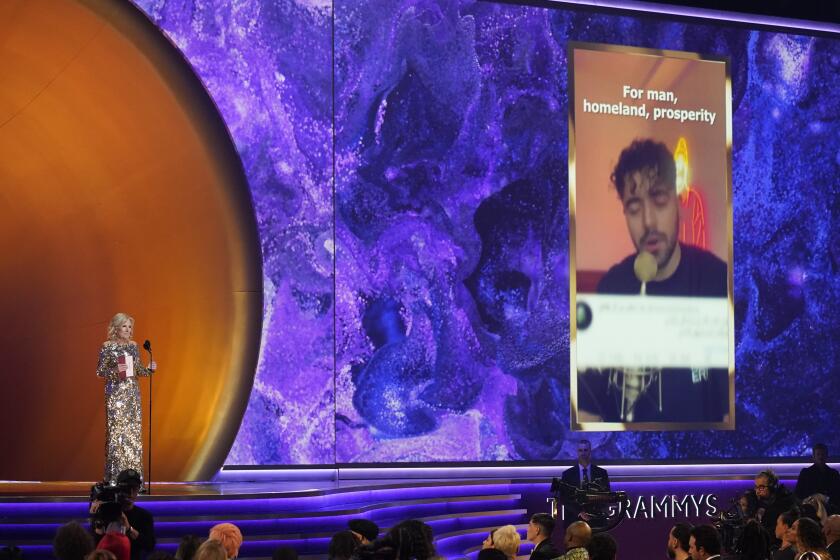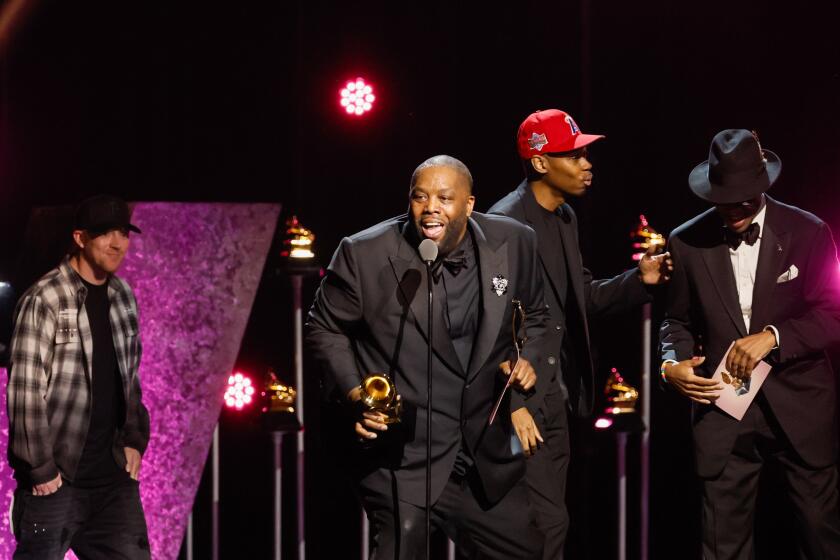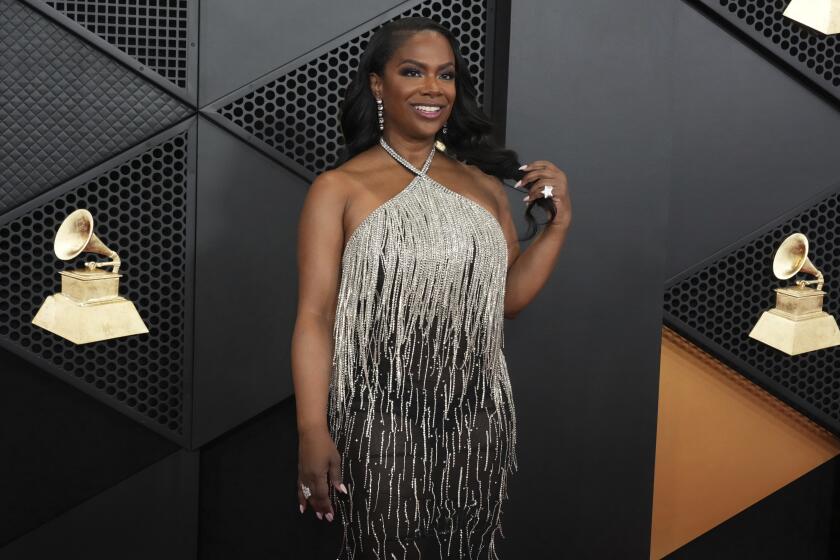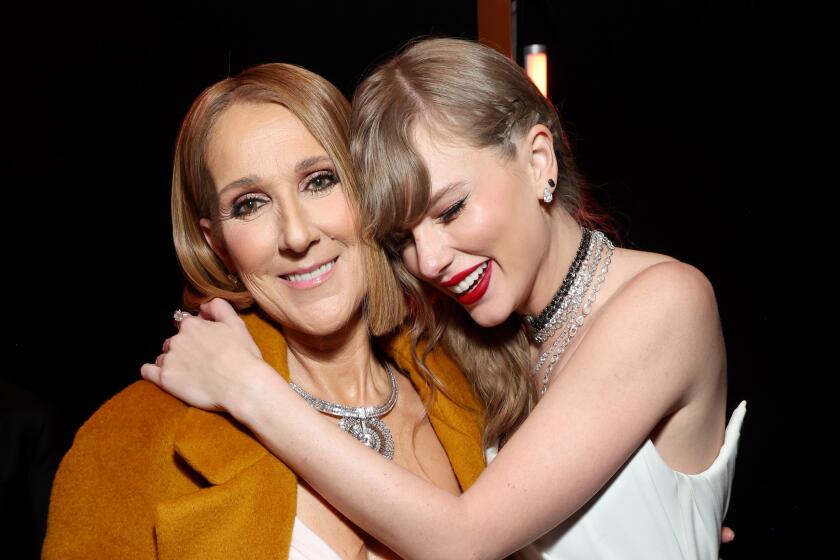What the Grammys got right — and wrong — when it came to Latin music

Even A-Rod got TV time.
The opening of the 61st Grammy Awards was a powerful and revved-up showcase of Latin music with bright lights and dizzying spins through song and dance centered on “Havana” singer Camila Cabello and other Latin music stars, most notably Puerto Rican star Ricky Martin and Colombian reggaeton star J Balvin, along with Atlanta rapper Young Thug and Arturo Sandoval, the Cuban American jazz trumpet maestro.
An offering of Spanglish and bicultural themes in music, roots and the unity banner was not lost in this historic union of recording artists giving their all in the live music spectacle from Los Angeles’ Staples Center.
“Dreams do come true and everything is possible,” Balvin, in an interview with The Times, said of being part of the groundbreaking opener. “We want to keep spreading our music and show the world that we are global. It’s about connecting with people all over the world.”
Yet given such a strong opening — and the forceful show of diversity that followed when host Alicia Keys came onstage with Lady Gaga, Jada Pinkett Smith, Michelle Obama and Jennifer Lopez — it was surprising that the Grammys telecast didn’t include one regional Mexican artist, considering that Mexicans are the second-largest racial or ethnic group in the U.S. at about 36 million.
Nonetheless, “Money” rapper Cardi B, Bronx-raised by a Dominican father and Trinidadian mother, slayed her performance, and the surprised look on her face as she made history as the first solo woman to win the rap album Grammy was priceless.

Lopez, with lots of cutaways to an admiring Alex Rodriguez, also gave her all to a Motown tribute, powering through her set with major dance moves, but was hit with criticism over social media because of her heritage. Why, many tweeted, did the Grammys “allow a Latina artist to perform songs … created by and geared toward black artists?” Smokey Robinson rejected the critics: “I think anyone who is upset is stupid,” he told Variety. And just after her performance, a tearful Lopez told “Entertainment Tonight, “I grew up on all of those songs. My mom passed them on to us. … You can’t tell people what to love. You can’t tell people what they can and can’t do, what they should sing or not sing. You’ve got to do what’s in your heart.”
One of the toughest jobs on any awards show is managing to be inclusive, respectful and relevant. This year’s Grammy producers made a statement by opening the show with a Latin theme, but some of the show’s misses could have been avoided by dedicating a few strategic moments, mere seconds, to give the Latin music showcase more depth:
It mattered that Grammy producers did not include a few seconds to acknowledge Colombian rapper Legarda, who just a few days before the Grammy show was killed in Medellín after a stray bullet from an unrelated street robbery pierced his head when he was sitting in his car in traffic. An outpouring of tributes from many of his 2.9 million Instagram followers continues, and Juanes, who said he never met him, posted an Instagram tribute to his own 3.2 million followers saying, “I feel the deep anger and frustration in seeing that lives full of light are extinguished in a second by the absurd violence of this world.”
It mattered that openly gay Latin trap Puerto Rican rapper Kevin Fret, 24, wasn’t even briefly mentioned after he was fatally shot in Puerto Rico in early January. An outspoken LGBTQ voice, Fret also appeared on Univision’s La Banda singing reality competition during the first season. Last month, his manager Eduardo Rodriguez asked everyone “to unite in these difficult times.”
It mattered that the Grammy-winning Jimmy Gonzalez, an icon in Tejano music and the frontman of Grupo Mazz, who died due to health issues, wasn’t included in the Grammy “In Memoriam” tributes. In June 2018, both Neil Portnow, president and CEO of the Recording Academy, and Gabriel Abaroa Jr., president and CEO of the Latin Recording Academy, released a joint statement, calling Gonzalez “an influential artist who combined his U.S. roots with traditional Mexican music to create his unique Tejano crossover sound.”
It mattered that the show opener didn’t include the talents of regional Mexican recording artists such as Christian Nodal, 20; Ángela Aguilar, 15; or Luis Coronel, 22 — all, except Nodal, born in the U.S. Coronel’s passion for urban music would have made him a natural in the opening set, which included many, including Cabello’s family; one more at the table would have been sweet.
Of course, this wasn’t the first year the Grammys prime-time broadcast showcased Latin music. Colombia’s Juanes, speaking with The Times, said that performing a song in Spanish at the 2015 Grammy show, a rarity for a Latin act, was a window to a growing worldwide audience.
“I was able present my culture and my country, but it represented so much more,” Juanes said. “I think there is also a very important story that’s very important with Latin music with the Grammys. May it continue to happen.”
It was significant that the song “I Like It,” by Latin urban stars Cardi B, J Balvin and Bad Bunny, was nominated for record of the year. Though they lost to Childish Gambino’s “This Is America,” their inclusion in the category — and Cardi B’s rap album win — showed the growing importance of Latin music. When YouTube put out its list of the most-viewed videos of 2018, eight of the top 10 were Spanish-language cuts.
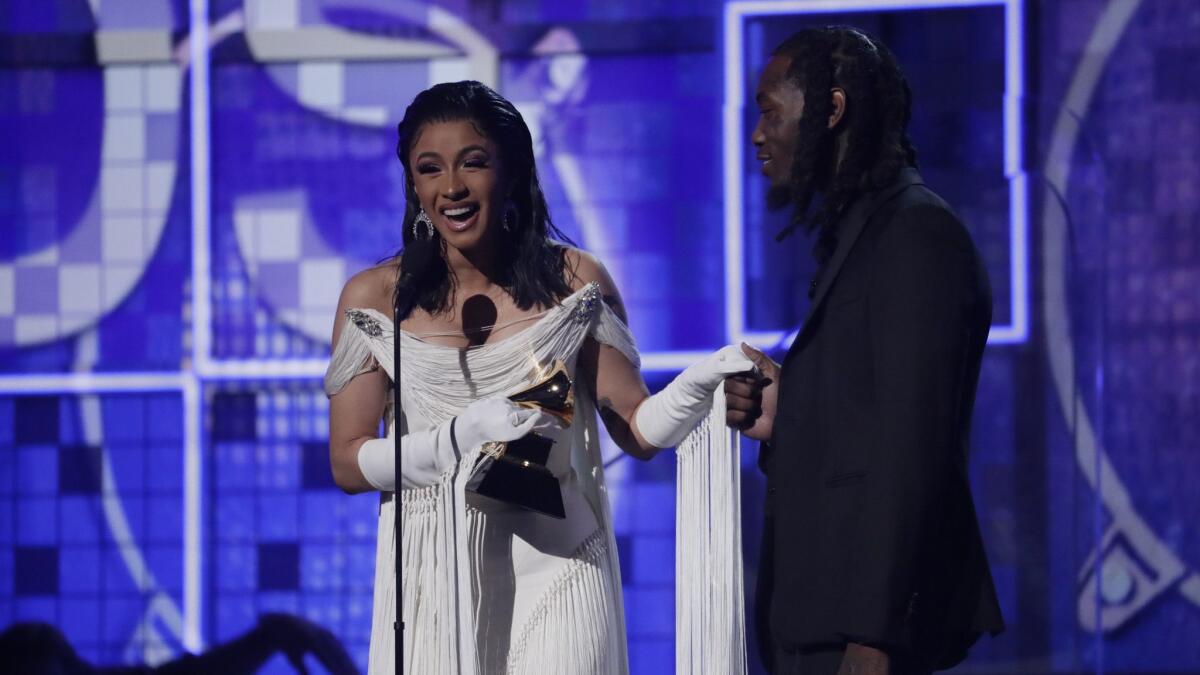
Even so, the Grammys in Latin pop, rock and regional Mexican music were given out before the CBS broadcast, during a live-streamed, pre-telecast ceremony earlier in the day. Among the winners was Mexico’s Luis Miguel, who, after a seven-year recording hiatus, returned with a new studio album of classic mariachi songs, “¡México Por Siempre!” (“Forever Mexico”), which won the Grammy for regional Mexican music album. The same album won album of the year at the Latin Grammy Awards in November. But the former heartthrob was a no-show at the pre-broadcast ceremony.
Instead, Miguel’s co-producer David Reitzas accepted the award and extended his gratitude to the Mexican ensemble Mariachi Vargas de Tecalitlan, which performed on the album.
“Luis, I love you,” said Reitzas, who has also worked with Celine Dion, the Weeknd and Andrea Bocelli. “Mariachi Vargas, you know how great you are. It was just a joy to make this record.”
Claudia Brant was more than happy to take the stage when her album “Sincera” was announced as the winner of the Latin pop album Grammy.
“This record has never been about the number of streams or followers,” said Brant, who was joined onstage by her producers Ezequiel “Cheche” Alara and Antonio “Moogie” Canazio. “It’s been about delivering great music.”
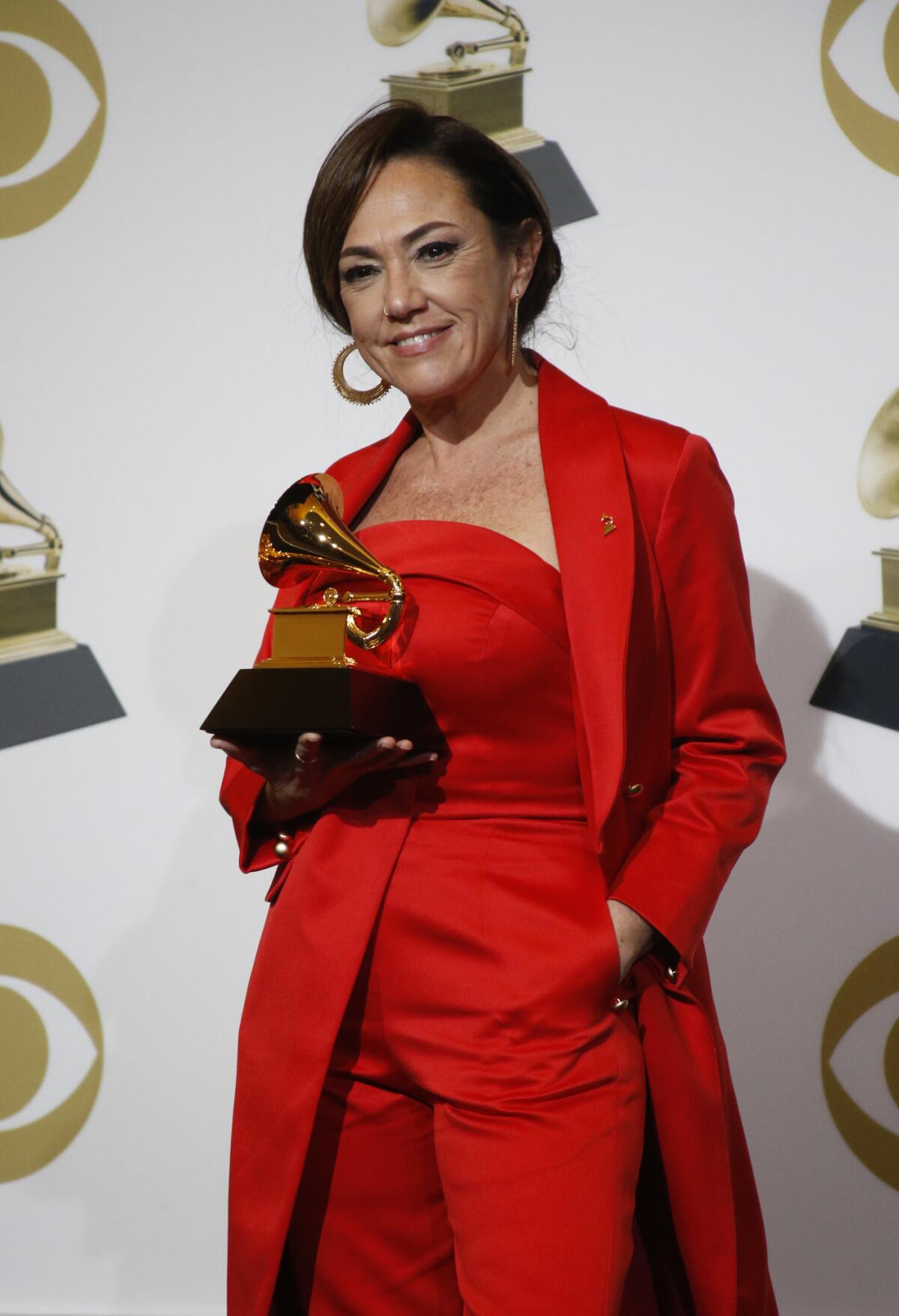
The Argentine-born Brant has spent most of her career as a songwriter in English, Spanish and Portuguese for artists such as Barbra Streisand, Ricky Martin and Jennifer Lopez. In recent years, though, she’s launched her own singing career.
“I came here 20 years ago as an immigrant and the doors were open to me,” Brant said during her acceptance speech. “I want to thank this country for the opportunity. I hope that chance is still open to the rest.”
Mexican rock band Zoé’s Aztlán won for Latin rock, urban or alternative album. The band was not present during the afternoon ceremony.
Spanish Harlem Orchestra, the salsa and Latin jazz group based in New York, took the Tropical Latin Album win for “Anniversary.” Their first Grammy win was in 2004 for salsa/merengue album for “Across 110th Street.”
“All glory goes to God,” said Oscar Hernandez, the group’s founder. “I want to thank the musicians of Spanish Harlem Orchestra for being one of the finest music ensembles.”
Three of the biggest names in Mexican music — Ángela Aguilar, Natalia Lafourcade and Aida Cuevas — performed the classic Mexican folk song “La Llorona” during the early ceremony. They may not have made it to the prime-time show, but this year the Grammys did extend their reach and showed the world that Latin music is a force to be reckoned with.
More to Read
The biggest entertainment stories
Get our big stories about Hollywood, film, television, music, arts, culture and more right in your inbox as soon as they publish.
You may occasionally receive promotional content from the Los Angeles Times.



